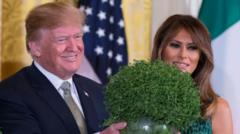In the lead-up to St. Patrick's Day, the annual pilgrimage of Irish politicians to Washington DC is more than just tradition; it’s a vital opportunity for fostering international relationships and encouraging US investment. Despite the longstanding custom, some Northern Irish representatives are opting out this year due to disagreements over Donald Trump's policies.
The missions aim primarily to solidify business ties and promote trade between the US and Ireland. Figures like Steve Aiken—a veteran participant—emphasize the necessity of face-to-face interactions, stating that building rapport without in-person engagement is ineffective. He underscores the complexity of these trips, which require politicians to be well-versed in their brief to actively engage in meaningful dialogue.
Máirtín Ó Muilleoir, a former Sinn Féin politician, shares the mixed feelings arising from attendance or absence at these events. He recalls his own experiences with missed occasions when he was unable to attend St. Patrick's festivities in Washington due to local political turmoil. The timing, coinciding with massive corporate promotions for St. Patrick's Day in the US, positions these visits perfectly for Irish leaders to capitalize on a heightened public interest.
The ceremonial presentation of a bowl of shamrock to the US president, a tradition since 1952, symbolizes goodwill between the US and Ireland, further illustrating the cultural connections that entwine both nations. Such gestures, while viewed ceremoniously, often lack measurable ties to specific financial outcomes, leading to debates surrounding the effectiveness of these diplomatic exchanges.
Historically, these visits have played roles in significant political milestones, such as the Good Friday Agreement. As the landscape of US-Ireland relations ebb and flow, figures like Aiken and Ó Muilleoir assert the importance of maintaining visibility, particularly given the diminishing prominence of Irish Americans in US politics.
Political tensions complicate the upcoming celebrations, as Sinn Féin and others decide against participation due to Trump’s international stance, illustrating the current moral dilemmas facing political leaders. Nevertheless, some advocates highlight the necessity of maintaining connections, especially regarding economic opportunities and employment prospects created by US firms operating in Northern Ireland.
Ultimately, while the dynamics surrounding St. Patrick's Day diplomacy continue to evolve, the desire to sustain a favorable relationship with the US remains a focal point for Irish politicians, underscoring the importance of both tradition and adaptability in political strategy.
The missions aim primarily to solidify business ties and promote trade between the US and Ireland. Figures like Steve Aiken—a veteran participant—emphasize the necessity of face-to-face interactions, stating that building rapport without in-person engagement is ineffective. He underscores the complexity of these trips, which require politicians to be well-versed in their brief to actively engage in meaningful dialogue.
Máirtín Ó Muilleoir, a former Sinn Féin politician, shares the mixed feelings arising from attendance or absence at these events. He recalls his own experiences with missed occasions when he was unable to attend St. Patrick's festivities in Washington due to local political turmoil. The timing, coinciding with massive corporate promotions for St. Patrick's Day in the US, positions these visits perfectly for Irish leaders to capitalize on a heightened public interest.
The ceremonial presentation of a bowl of shamrock to the US president, a tradition since 1952, symbolizes goodwill between the US and Ireland, further illustrating the cultural connections that entwine both nations. Such gestures, while viewed ceremoniously, often lack measurable ties to specific financial outcomes, leading to debates surrounding the effectiveness of these diplomatic exchanges.
Historically, these visits have played roles in significant political milestones, such as the Good Friday Agreement. As the landscape of US-Ireland relations ebb and flow, figures like Aiken and Ó Muilleoir assert the importance of maintaining visibility, particularly given the diminishing prominence of Irish Americans in US politics.
Political tensions complicate the upcoming celebrations, as Sinn Féin and others decide against participation due to Trump’s international stance, illustrating the current moral dilemmas facing political leaders. Nevertheless, some advocates highlight the necessity of maintaining connections, especially regarding economic opportunities and employment prospects created by US firms operating in Northern Ireland.
Ultimately, while the dynamics surrounding St. Patrick's Day diplomacy continue to evolve, the desire to sustain a favorable relationship with the US remains a focal point for Irish politicians, underscoring the importance of both tradition and adaptability in political strategy.





















